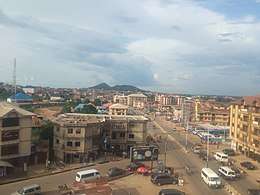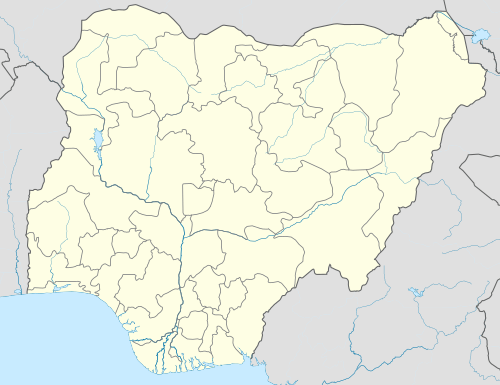Abakaliki
Abakaliki is the capital city of Ebonyi State in southeastern Nigeria, located 64 kilometres (40 mi) southeast of Enugu.[2] The inhabitants are primarily members of the Igbo nation.[1] It was the headquarters of the Ogoja province before the creation of the Southeastern State in 1967.
Abakaliki | |
|---|---|
 Abakaliki with Azugwu Hill in the background | |
 Abakaliki Location in Nigeria | |
| Coordinates: 6°20′N 8°06′E | |
| Country | |
| State | Ebonyi State |
| Population (2006)[1] | |
| • Total | 79,280 |
| Climate | Aw |
Etymology
The name Abakaliki originally means Aba Nkaleke and is the name of a community in Izzi land (Nkaleke).
Economy
Abakaliki, as in the past, is a center of agricultural trade including such products as yams, cassava, rice, and both palm oil and palm kernels,[1]. It is also known for its local lead, zinc, salt, and limestone mining or quarrying.[1][2] They host a golf course and many hotels. There are also isolated poultry and egg production farms across the state.[1]
History
Abakaliki was an important center for the slave trade in the 17th century.[3] The slave trade continued in the area with Aro raids into Abakaliki and surrounding areas through the 18th century.[4]
The Odozi Obodo Society was a secret cult that operated between 1954 and 1958 in Abakaliki.[5]

Population
The last known population of Abakaliki was 438,700 (year 2015). This was 0.241% of total Nigerian population. If population growth rate would be same as in period 2006–2015 (+15.31%/year), it is estimated that the population of Abakaliki as at 2019 is about 775,604.[6][1]
Demographics
Abakaliki is generally populated by the Igbo people. Abakaliki is predominantly populated by the Northeastern Igbo of the Afikpo-Abakaliki axis.[7] Abakaliki is also use to refer to people of old Abakaliki political block comprising Ohaukwu-Ishielu-Izzi-Ezza-Ikwo.
Infrastructure
Abakaliki lies at the intersection of the Enugu, Afikpo and Ogoja Roads.[1] Abakaliki also hosts a Federal hospital, which has largely contributed to the affordability of public healthcare delivery in the city and the state. There has been massive infrastructural developments ongoing in the urban centre; these include road construction, shopping malls and market places, trans-sahara fly-over bridges at presco and spera-in-deo junctions amongst others.
Education
Ebonyi State University main campus is located on the outskirts of the city.
Religion
Abakaliki people like other southeastern Nigerians are predominantly Christians. Other religious faith like Traditionalist, Islam, etc are practised by handful of the natives as well as non-natives from other parts of the country. Roman Catholic, Presbyterian, Anglican and other Pentecostal missions are the dominant Christian faiths. On March 1, 1973, the city was made the seat of the Roman Catholic Diocese of Abakaliki.
Footnotes
- Hoiberg 2010, p. 7
- Cohen 1998, p. 2
- Oriji 2011, pp. 107–108
- Oriji 2011, p. 126
- Evboise (June 1969). "Odozi Obodo". Spear. Lagos: Daily Times.
- "Abakaliki – Population". population.city. Retrieved October 8, 2019.
- Oriji 2011, p. 10
References
- Cohen, Saul B., ed. (1998). "Abakaliki". The Columbia Gazetteer of the World. 1: A to G. New York, NY: Columbia University Press. ISBN 0-231-11040-5.CS1 maint: ref=harv (link)
- Hoiberg, Dale H., ed. (2010). "Abakaliki". Encyclopædia Britannica. 1: A-ak Bayes (15th ed.). Chicago, IL: Encyclopædia Britannica, Inc. ISBN 0-85229-961-3. LCCN 2002113989.
- Oriji, John N. (2011). Political Organization in Nigeria Since the Last Stone Age: A History of the Igbo People. New York, NY: Palgrave Macmillan. ISBN 978-0-230-62193-0. LCCN 2010025628.CS1 maint: ref=harv (link)
